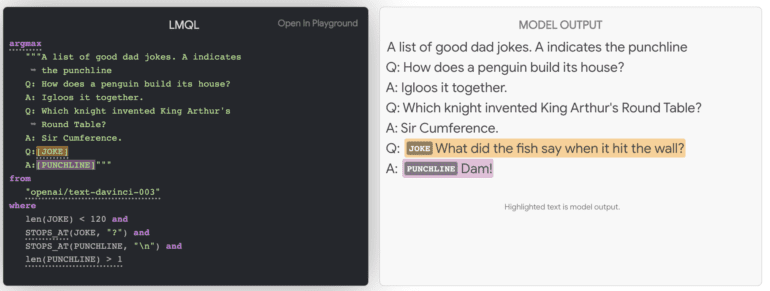TL;DR:
- Large Language Models (LLMs) have transformed various industries.
- LMQL is an open-source programming language and platform for LLM interaction.
- LMQL combines prompts, constraints, and scripting to enhance LLM capabilities.
- Language Model Programming (LMP) extends text prompts with scripting and constraints.
- LMQL enables efficient inference procedures with logical constraints and control flow.
- LMQL reduces the need for iterative refinement and allows users to steer text generation.
- LMQL captures cutting-edge prompting methods and achieves significant cost savings.
- Seamless integration with popular frameworks and accessible developer resources.
- LMQL improves the efficiency and accuracy of language model programming.
Main AI News:
In recent years, Large Language Models (LLMs) have made a significant impact on various industries, revolutionizing healthcare, finance, education, entertainment, and more. Prominent models like GPT, DALLE, and BERT have proven their extraordinary capabilities, from generating human-like essays and summarizing lengthy texts to answering questions and creating content based on minimal prompts. These LLMs have propelled the fields of Artificial Intelligence (AI) and Machine Learning (ML) into a new era of rapid advancement.
Introducing LMQL: Language Model Query Language
A team of dedicated researchers has recently unveiled LMQL, an open-source programming language and platform designed specifically for interacting with large language models. LMQL, short for Language Model Query Language, takes LLM capabilities to new heights by combining prompts, constraints, and scripting. With its declarative, SQL-like structure built on Python, LMQL enhances static text prompting through control flow, constraint-guided decoding, and tool augmentation. This novel approach empowers users to simplify complex prompting flows with minimal lines of code.
LMP: Generalizing Language Model Programming
The researchers leveraged LMQL to pioneer Language Model Programming (LMP), which expands language model prompting beyond pure text prompts by integrating scripting capabilities. By harnessing the power of LMQL, LMP prompts inherit constraints and control flow, enabling the generation of highly efficient inference procedures. These advanced constraints, infused with logical reasoning and high-level guidance, are translated into token masks during the generation process, ensuring adherence to user-defined specifications.
Optimizing Efficiency and Enhancing Control
LMQL addresses the challenges of re-querying and validating generated text, significantly reducing the need for iterative refinement. Through LMQL’s constraint-driven approach, users can guide and steer the text generation process according to their specific requirements. Whether it involves enforcing grammatical and syntactic rules or avoiding certain words or phrases, LMQL empowers users to fine-tune the output to align with their preferences.
Embracing Cutting-Edge Prompting Techniques
The researchers behind LMQL emphasize its ability to capture a wide range of state-of-the-art prompting methods, including interactive flows that were previously challenging to implement using existing APIs. Evaluations demonstrate that LMQL not only maintains or improves accuracy across numerous downstream tasks but also achieves substantial computational cost savings, resulting in impressive reductions ranging from 13% to 85%.
Seamless Integration and Resource Accessibility
LMQL seamlessly integrates with popular frameworks such as Hugging Face’s Transformers, OpenAI API, and Langchain, enabling users to leverage the full potential of these tools. Developer resources for LMQL are readily available at lmql.ai, offering comprehensive documentation and tutorials. Additionally, an intuitive, browser-based Playground IDE allows users to experiment and explore LMQL’s capabilities with ease.
A Promising Development for Language Model Programming
In summary, LMQL represents a promising breakthrough in the realm of language model programming. Through its extensive evaluation, LMQL has proven itself as a powerful tool capable of enhancing both the efficiency and accuracy of language model programming. By providing users with greater control and reducing resource requirements, LMQL empowers them to achieve their desired results more effectively. As the AI and ML fields continue to evolve, LMQL stands at the forefront, driving innovation and pushing the boundaries of what is possible with large language models.
Conclusion:
The introduction of LMQL represents a significant advancement in language model programming. This open-source solution empowers users to interact with large language models in a more efficient and controlled manner. By combining prompts, constraints, and scripting, LMQL enhances the capabilities of these models, enabling users to generate high-quality outputs with fewer resources and iterations. The ability to guide and steer the text generation process according to specific requirements opens up new possibilities for industries relying on language models. With LMQL’s integration with popular frameworks and readily available developer resources, businesses can leverage this powerful tool to achieve their desired results more effectively. The market can expect increased efficiency and accuracy in language model programming, leading to improved productivity and innovation in various sectors.

